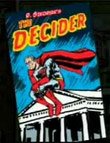Bad Apple in Chief

Points made in Ron Suskind's new book, THE ONE PERCENT DOCTRINE, as described in Barton Gellman's Washington Post book review, as helpfully collected by Matthew Yglesias:
- Al-Qaedist Abu Zubaydah was captured in March 2002.
- Zubaydah's captors discovered he was mentally ill and charged with minor logistical matters, such as arranging travel for wives and children.
- The President was informed of that judgment by the CIA.
- Two weeks later, the President described Zubaydah as "one of the top operatives plotting and planning death and destruction on the United States."
- Later, Bush told George Tenet, "I said he was important. You're not going to let me lose face on this, are you?" and asked Tenet if "some of these harsh methods really work?"
- The methods -- torture -- were applied.
- Then, according to Gellman, "Under that duress, he began to speak of plots of every variety -- against shopping malls, banks, supermarkets, water systems, nuclear plants, apartment buildings, the Brooklyn Bridge, the Statue of Liberty."
- At which point, according to Suskind, "thousands of uniformed men and women raced in a panic to each . . . target."
Abu Zubaydah, his captors discovered, turned out to be mentally ill and nothing like the pivotal figure they supposed him to be. CIA and FBI analysts, poring over a diary he kept for more than a decade, found entries "in the voice of three people: Hani 1, Hani 2, and Hani 3" -- a boy, a young man and a middle-aged alter ego. All three recorded in numbing detail "what people ate, or wore, or trifling things they said." Dan Coleman, then the FBI's top al-Qaeda analyst, told a senior bureau official, "This guy is insane, certifiable, split personality."As if the fresh news wasn't enough that the President approved torture-in-the-name-of-not-losing-face, the book review reveals a few other new points about Bush's negligence in the conflict with Al Qaeda:
Abu Zubaydah also appeared to know nothing about terrorist operations; rather, he was al-Qaeda's go-to guy for minor logistics -- travel for wives and children and the like. That judgment was "echoed at the top of CIA and was, of course, briefed to the President and Vice President," Suskind writes. And yet somehow, in a speech delivered two weeks later, President Bush portrayed Abu Zubaydah as "one of the top operatives plotting and planning death and destruction on the United States." And over the months to come, under White House and Justice Department direction, the CIA would make him its first test subject for harsh interrogation techniques.
. . .
"I said he was important," Bush reportedly told Tenet at one of their daily meetings. "You're not going to let me lose face on this, are you?" "No sir, Mr. President," Tenet replied. Bush "was fixated on how to get Zubaydah to tell us the truth," Suskind writes, and he asked one briefer, "Do some of these harsh methods really work?" Interrogators did their best to find out, Suskind reports. They strapped Abu Zubaydah to a water-board, which reproduces the agony of drowning. They threatened him with certain death. They withheld medication. They bombarded him with deafening noise and harsh lights, depriving him of sleep. . . . And so, Suskind writes, "the United States would torture a mentally disturbed man and then leap, screaming, at every word he uttered."
The book's opening anecdote tells of an unnamed CIA briefer who flew to Bush's Texas ranch during the scary summer of 2001, amid a flurry of reports of a pending al-Qaeda attack, to call the president's attention personally to the now-famous Aug. 6, 2001, memo titled "Bin Ladin Determined to Strike in US." Bush reportedly heard the briefer out and replied: "All right. You've covered your ass, now." Three months later, with bin Laden holed up in the Afghan mountain redoubt of Tora Bora, the CIA official managing the Afghanistan campaign, Henry A. Crumpton (now the State Department's counterterrorism chief), brought a detailed map to Bush and Cheney. White House accounts have long insisted that Bush had every reason to believe that Pakistan's army and pro-U.S. Afghan militias had bin Laden cornered and that there was no reason to commit large numbers of U.S. troops to get him. But Crumpton's message in the Oval Office, as told through Suskind, was blunt: The surrogate forces were "definitely not" up to the job, and "we're going to lose our prey if we're not careful.""I'm the Decider, and I decide what is best."

Update:
Suskind discussed some more horrible decisions from the Decider on Wolf Blitzer's June 20 show. Suskind's reporting confirmed the long-suspected belief (discussed for example in the documentary Control Room) that the Bush Administration deliberately targeted Al Jazeera journalists for death:
BLITZER: One of the other explosive charges you have in the book is that the U.S. deliberately bombed the Al Jazeera offices in Kabul to make a point. You write this: 'On November 13, a hectic day when Kabul fell to the Northern Alliance and there were celebrations in the streets of the city, a U.S. missile obliterated Al Jazeera's office. Inside the CIA and White House there was satisfaction that a message had been sent to Al Jazeera.'
Are you suggesting that someone in the U.S. government made a deliberate decision to take out the Al Jazeera office in Kabul?
SUSKIND: My sources are clear that that was done on purpose, precisely to send a message to Al Jazeera, and essentially a message was sent.

0 Comments:
Post a Comment
<< Home